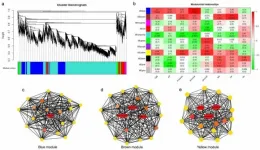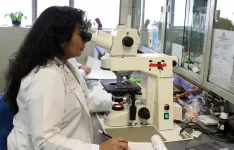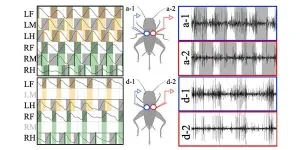(Press-News.org) Food allergies have been increasing dramatically across the developed world for more than 30 years. For instance, as many as 8% of children in the U.S. now experience potentially lethal immune system responses to such foods as milk, tree nuts, fish and shellfish. But scientists have struggled to explain why that is. A prevailing theory has been that food allergies arise because of an absence of natural pathogens such as parasites in the modern environment, which in turn makes the part of the immune system that evolved to deal with such natural threats hypersensitive to certain foods.
In a paper published Jan. 14 in the journal Cell, four Yale immunobiologists propose an expanded explanation for the rise of food allergies -- the exaggerated activation of our food quality control system, a complex and highly evolved program designed to protect us against eating harmful foods. The presence of unnatural substances, including processed food, or environmental chemicals, such as dishwashing detergent, in the modern environment, as well as the absence of natural microbial exposure, play a role in disrupting this food quality control program, they argue.
The theory can lay the groundwork for future treatment or prevention of food allergies, the scientists suggest.
"We can't devise ways to prevent or treat food allergies until we fully understand underlying biology," said co-author Ruslan Medzhitov, Sterling Professor of Immunobiology and investigator for the Howard Hughes Medical Institute. "You can't be a good car mechanic if you don't know how a normal car works."
The quality food control program present in the biology of all animals includes sensory guardians -- if something smells or tastes bad, we don't eat it. And there are sentinels in the gut -- if we consume toxins, they are detected and expelled. In the latter case, a part of the immune system as well as parasympathetic arm of the nervous system also mobilize to help neutralize the threat.
This type of immune system response triggers allergies, including food allergies, a fact that gave rise to the so-called "hygiene hypothesis" of food allergies. The lack of natural threats such as parasites made this portion of the immune system hypersensitive and more likely to respond to generally innocuous proteins found in certain food groups, the theory holds. This helped explain why people living in rural areas of the world are much less likely to develop food allergies than those living in more urban areas.
However, food allergies have continued to rise dramatically long after elimination of parasites in the developed world, Medzhitov noted. So the Yale team now theorizes that other environmental factors influenced activity within the natural food quality control system and contributed to immune system hypersensitivity to certain food allergens.
"One factor is increased use of hygiene products and overuse of antibiotics and, secondly, a change in diet and the increased consumption of processed food with reduced exposure to naturally grown food and changed composition of the gut microbiome," Medzhitov said. "Finally, the introduction of food preservatives and environmental chemicals such as dishwashing detergents introduced novel elements for immune system to monitor."
Collectively, these changes in the environment effectively trigger food quality control responses making the immune system react to food proteins the way it would react to toxic substances, the team argues.
"It's guilt by association," Medzhitov said.
Food allergies are no different than many other diseases, which are caused by abnormal versions of normal biological responses, he said. Understanding the underlying biology of normal processes such as food quality control system should help researchers identify potential culprits not only in food allergies, but other diseases as well, the authors argue.
INFORMATION:
Yale co-authors are Esther Florsheim, a former postdoctoral research associate, Zuri Sullivan, a postdoctoral associate, and William Khoury-Hanold, a postdoctoral fellow, of the Yale Department of Immunology.
Focusing on the largest health care system in the Northeast, the study is among the first to document the pandemic's impact on cancer screening and diagnosis.
Screening and diagnoses rebounded in the months following the first surge of the pandemic.
The authors urge those who delayed screenings during the height of the pandemic to contact their health care provider to discuss the potential need to reschedule one.
BOSTON - In one of the first studies to examine the impact of the COVID-19 pandemic on cancer diagnoses, researchers at Dana-Farber/Brigham and Women's ...
HOUSTON - (Jan. 14, 2021) - Researchers at Baylor College of Medicine have discovered how therapeutics targeting RNA splicing can activate antiviral immune pathways in triple negative breast cancers (TNBC) to trigger tumor cell death and signal the body's immune response. A new study published in Cell shows that endogenous mis-spliced RNA in tumor cells mimics an RNA virus, leading tumor cells to self-destruct as if fighting an infection. Researchers suggest this mechanism could open new avenues for turning on the immune system in aggressive cancers like TNBC.
"We know therapeutics that partially interfere with RNA splicing can have a very strong impact on tumor growth and progression, but the mechanisms of tumor killing are largely ...
A vector refers to an organism that carries and transmits an infectious disease, as mosquitoes do malaria.
Lead compounds are chemical compounds that show promise as treatment for a disease and may lead to the development of a new drug.
Antiplasmodial lead compounds are those that counter parasites of the genus Plasmodium, which is the parasite that infects mosquitoes and causes malaria in people.
The study findings were published in Nature Communications on 11 January 2021, at a time when malaria incidence generally peaks after the holiday season.
MOSQUITO INFECTION EXPERIMENT CENTRE
Professor Lizette Koekemoer, co-director of the WRIM and the National Research ...
Recently, the innovation project watermelon and melon cultivation and physiology team of Zhengzhou Fruit Research Institute has made new progress in the metabolism regulation of sugar and organic acid in watermelon fruit. The changes of sugar and organic acid during the fruit development were analyzed and the key gene networks controlling the metabolism of sugar and organic acid during the fruit development were identified. These results provided a theoretical basis for watermelon quality breeding, which had important scientific significance for the development of watermelon industry and the improvement of watermelon breeding level in China. The related research results were published in the journals of Horticulture Research and Scientia Horticulturae.
The ...
Research led by the University of Birmingham and Birmingham Women's and Children's NHS Foundation Trust has revealed new insight into the biological mechanisms of the long-term positive health effects of breastfeeding in preventing disorders of the immune system in later life.
Breastfeeding is known to be associated with better health outcomes in infancy and throughout adulthood, and previous research has shown that babies receiving breastmilk are less likely to develop asthma, obesity, and autoimmune diseases later in life compared to those who are exclusively formula fed.
However, up until now, the immunological mechanisms responsible for these effects have been very poorly understood. In this new study, ...
Aerosols are suspensions of fine solid particles or liquid droplets in a gas. Clouds, for example, are aerosols because they consist of water droplets dispersed in the air. Such droplets are produced in a two-step process: first, a condensation nucleus forms, and then volatile molecules condense onto this nucleus, producing a droplet. Nuclei frequently consist of molecules different to those that condense onto them. In the case of clouds, the nuclei often contain sulphuric acids and organic substances. Water vapour from the atmosphere subsequently condenses onto these nuclei.
Scientists led by Ruth Signorell, Professor at the Department of Chemistry and Applied ...
Leading cancer experts at the University of Birmingham have solved a long-standing question of how various types of mutations in just one gene cause different types of diseases.
A team of scientists at the University's Institute of Cancer and Genomic Sciences, led by Professor Constanze Bonifer, studied a gene known as RUNX1, which is responsible for providing instructions for the development of all blood cells and is frequently mutated in blood cancers.
The results of their research has shown that the balance of cells types in the blood is affected much earlier than previously thought, which is particularly important for families that carry ...
Adaptability explains why insects spread so widely and why they are the most abundant animal group on earth. Insects exhibit resilient and flexible locomotion, even with drastic changes in their body structure such as losing a limb.
A research group now understands more about adaptive locomotion in insects and the mechanisms underpinning it. This knowledge not only reveals intriguing information about the biology of the insects, but it can also help to design more robust and resilient multi-legged robots that are able to adapt to similar physical damage.
The insect nervous system is comprised of approximately 105 to 106 neurons. Understanding ...
Posidonia oceanica seagrass -an endemic marine phanerogam with an important ecological role in the marine environment- can take and remove plastic materials that have been left at the sea, according to a study published in the journal Scientific Reports. The article's first author is the tenure-track 2 lecturer Anna Sànchez-Vidal, from the Research Group on Marine Geosciences of the Faculty of Earth Sciences of the University of Barcelona (UB).
The study describes for the first time the outstanding role of the Posidonia as a filter and trap for plastics in the coastal areas, and it is pioneer ...
Both past and present-day scientists have suspected the intestines of playing a role in various diseases. Present-day studies focus on the intestinal flora's role in physical diseases such as diabetes and overweight, while others seek to establish a connection between the intestinal flora and e.g. autism, schizophrenia and depression. But even modern-day scientists have difficulties studying the around 500-1000 different species among the approx. 100 billion active bacteria in our intestines.
Therefore, researchers from the University of Copenhagen have developed a ground-breaking technique that ...







